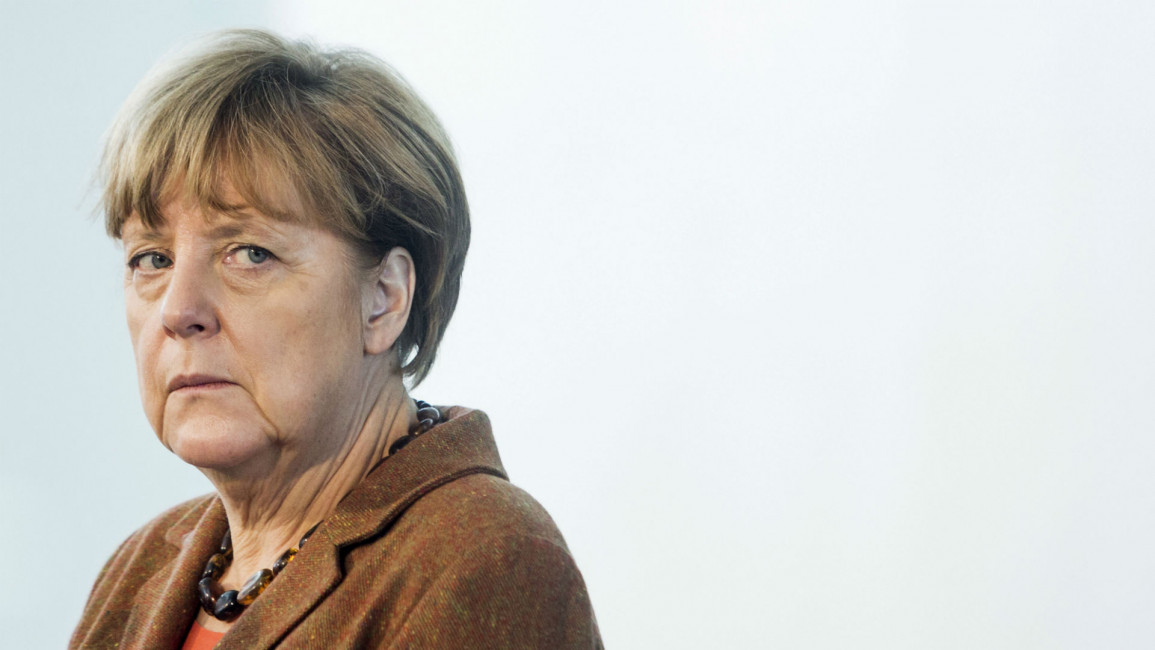Algeria will take back its citizens illegally in Germany
Algeria will take back its citizens illegally in Germany
Algeria will accept deportations of its citizens living in Germany.
2 min read
Merkel wants to classify Algeria as a "safe" country (Getty)
Algeria will take back its citizens illegally residing in Germany, Prime Minister Ahmed Ouyahia pledged Monday during a visit by the country's Chancellor Angela Merkel.
"I confirm that Algeria will bring its citizens back, whether it's a matter of 3,000 or 5,000 (people)," the premier said during a news conference alongside Merkel.
Ouyahia said most citizens had been returned on Air Algerie flights, adding the process could be speedier if Berlin was able to convince Lufthansa to fly them back on its regular flights.
Merkel affirmed the "will in Germany to welcome those who have good reasons to flee their countries," such as Iraqis and Syrians, offering them the right to stay and work.
"On the other hand, where the right to remain does not exist we expect that the state can take action.
"To that end, we need partners who are in agreement with us and Algeria is one of those partners," Merkel said.
Ouyahia said the Algerian authorities were also taking action against those illegally entering its territory.
"Algeria does battle for the rest of the international community," he said, by preventing "20,000 to 30,000 people annually from entering Algeria illegally" from where many continue their journeys to Europe.
Berlin wants to classify the North African nation as a "safe" country, as part of a legal change which would make it harder for Algerians to claim asylum in Germany.
Algiers has meanwhile asked Berlin to implement extradition requests issued by Algerian courts.
Speaking on Monday, Ouyahia denied Algeria had abandoned "Africans in the desert", following accusations by rights groups that thousands of migrants were dumped at the border.
Earlier this month the International Organization for Migration said more than 400 people had been rescued from the desert in northern Niger in two days, without specifying whether they had been pushed back from neighbouring Algeria.
Merkel, who departed Algeria later on Monday, also met with the country's ailing president, 81-year-old Abdelaziz Bouteflika during her official visit.
As well as migration, economic issues and terrorism were also on the agenda, according to official Algerian Press Service.
"We wish... to contribute to the diversification of the Algerian economy" hit hard by low oil prices, Merkel said.
She also said Germany was willing to continue its "close cooperation" with Algeria in defence and security, particularly for "the fight against terrorism and internal security".
"I confirm that Algeria will bring its citizens back, whether it's a matter of 3,000 or 5,000 (people)," the premier said during a news conference alongside Merkel.
Ouyahia said most citizens had been returned on Air Algerie flights, adding the process could be speedier if Berlin was able to convince Lufthansa to fly them back on its regular flights.
Merkel affirmed the "will in Germany to welcome those who have good reasons to flee their countries," such as Iraqis and Syrians, offering them the right to stay and work.
"On the other hand, where the right to remain does not exist we expect that the state can take action.
"To that end, we need partners who are in agreement with us and Algeria is one of those partners," Merkel said.
Ouyahia said the Algerian authorities were also taking action against those illegally entering its territory.
"Algeria does battle for the rest of the international community," he said, by preventing "20,000 to 30,000 people annually from entering Algeria illegally" from where many continue their journeys to Europe.
Berlin wants to classify the North African nation as a "safe" country, as part of a legal change which would make it harder for Algerians to claim asylum in Germany.
Algiers has meanwhile asked Berlin to implement extradition requests issued by Algerian courts.
Speaking on Monday, Ouyahia denied Algeria had abandoned "Africans in the desert", following accusations by rights groups that thousands of migrants were dumped at the border.
Earlier this month the International Organization for Migration said more than 400 people had been rescued from the desert in northern Niger in two days, without specifying whether they had been pushed back from neighbouring Algeria.
Merkel, who departed Algeria later on Monday, also met with the country's ailing president, 81-year-old Abdelaziz Bouteflika during her official visit.
As well as migration, economic issues and terrorism were also on the agenda, according to official Algerian Press Service.
"We wish... to contribute to the diversification of the Algerian economy" hit hard by low oil prices, Merkel said.
She also said Germany was willing to continue its "close cooperation" with Algeria in defence and security, particularly for "the fight against terrorism and internal security".


![President Pezeshkian has denounced Israel's attacks on Lebanon [Getty]](/sites/default/files/styles/image_684x385/public/2173482924.jpeg?h=a5f2f23a&itok=q3evVtko)



 Follow the Middle East's top stories in English at The New Arab on Google News
Follow the Middle East's top stories in English at The New Arab on Google News


